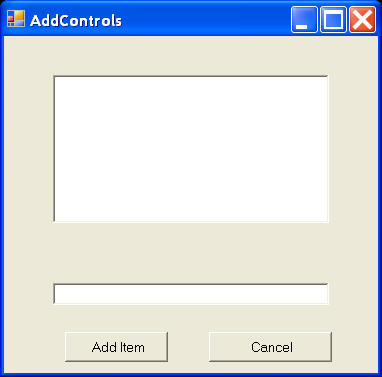Add controls to a form

/*
C# Programming Tips & Techniques
by Charles Wright, Kris Jamsa
Publisher: Osborne/McGraw-Hill (December 28, 2001)
ISBN: 0072193794
*/
using System;
using System.Drawing;
using System.Collections;
using System.ComponentModel;
using System.Windows.Forms;
using System.Data;
namespace AddControls
{
/// <summary>
/// Summary description for AddControls.
/// </summary>
public class AddControls : System.Windows.Forms.Form
{
private System.Windows.Forms.ListBox listBox1;
private System.Windows.Forms.Button button1;
private System.Windows.Forms.TextBox textBox1;
private System.Windows.Forms.Button button2;
/// <summary>
/// Required designer variable.
/// </summary>
private System.ComponentModel.Container components = null;
public AddControls()
{
//
// Required for Windows Form Designer support
//
InitializeComponent();
//
// TODO: Add any constructor code after InitializeComponent call
//
}
/// <summary>
/// Clean up any resources being used.
/// </summary>
protected override void Dispose( bool disposing )
{
if( disposing )
{
if (components != null)
{
components.Dispose();
}
}
base.Dispose( disposing );
}
#region Windows Form Designer generated code
/// <summary>
/// Required method for Designer support - do not modify
/// the contents of this method with the code editor.
/// </summary>
private void InitializeComponent()
{
this.button2 = new System.Windows.Forms.Button();
this.textBox1 = new System.Windows.Forms.TextBox();
this.button1 = new System.Windows.Forms.Button();
this.listBox1 = new System.Windows.Forms.ListBox();
this.SuspendLayout();
//
// button2
//
this.button2.Location = new System.Drawing.Point(160, 240);
this.button2.Name = "button2";
this.button2.Size = new System.Drawing.Size(96, 24);
this.button2.TabIndex = 3;
this.button2.Text = "Cancel";
this.button2.Click += new System.EventHandler(this.button2_Click);
//
// textBox1
//
this.textBox1.Location = new System.Drawing.Point(38, 200);
this.textBox1.Name = "textBox1";
this.textBox1.Size = new System.Drawing.Size(216, 20);
this.textBox1.TabIndex = 1;
this.textBox1.Text = "";
//
// button1
//
this.button1.Location = new System.Drawing.Point(48, 240);
this.button1.Name = "button1";
this.button1.Size = new System.Drawing.Size(80, 24);
this.button1.TabIndex = 2;
this.button1.Text = "Add Item";
this.button1.Click += new System.EventHandler(this.button1_Click);
//
// listBox1
//
this.listBox1.Location = new System.Drawing.Point(38, 32);
this.listBox1.Name = "listBox1";
this.listBox1.Size = new System.Drawing.Size(216, 147);
this.listBox1.TabIndex = 0;
//
// Form1
//
this.AutoScaleBaseSize = new System.Drawing.Size(5, 13);
this.ClientSize = new System.Drawing.Size(292, 273);
this.Controls.AddRange(new System.Windows.Forms.Control[] {
this.button2,
this.button1,
this.textBox1,
this.listBox1});
this.Name = "AddControls";
this.Text = "AddControls";
this.ResumeLayout(false);
}
#endregion
/// <summary>
/// The main entry point for the application.
/// </summary>
[STAThread]
static void Main()
{
Application.Run(new AddControls());
}
private void button1_Click(object sender, System.EventArgs e)
{
if (textBox1.Text == "")
return;
string strAdd = textBox1.Text;
if (listBox1.FindString (strAdd, -1) < 0)
{
listBox1.Items.Add (strAdd);
textBox1.Text = "";
textBox1.Focus ();
return;
}
MessageBox.Show ("\"" + strAdd + "\" is already in the list box", "Duplicate");
}
private void button2_Click(object sender, System.EventArgs e)
{
Application.Exit();
}
}
}
Related examples in the same category